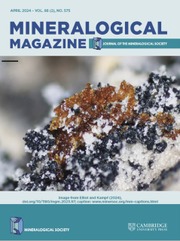Article contents
Odigitriaite, CsNa5Ca5[Si14B2O38]F2, a new caesium borosilicate mineral from the Darai-Pioz alkaline massif, Tajikistan: Description and crystal structure
Published online by Cambridge University Press: 02 January 2018
Abstract
Odigitriaite, a new Cs, Na, Ca borosilicate mineral, was discovered in moraine adjacent to the Darai-Pioz alkaline massif in the upper reaches of the Darai-Pioz river at the intersection of the Turkestansky, Zeravshansky and Alaisky mountain ridges, Tajikistan. It occurs as irregular thin flakes associated with quartz, pectolite, baratovite, fluorite, pekovite, polylithionite, aegirine, leucosphenite, pyrochlore, neptunite, reedmergnerite, mendeleevite-(Ce), zeravshanite and sokolovaite. It is colourless with a white streak, is translucent and has a vitreous lustre; it does not fluoresce under ultraviolet light. Odigitriaite is brittle with an uneven fracture and a Mohs hardness of 5. The calculated density is 2.80(2) g/cm3. The indices of refraction are α = 1.502, β = 1.564, γ = 1.576; 2Vobs = 46(2)°, dispersion is weak r > v, and there is no pleochroism. The chemical composition is as follows (electron microprobe, H2O calculated from structure): SiO2 55.30, Al2O3 0.09, Y2O3 0.44, MnO 0.94, FeO 0.10, PbO 0.21, K2O 0.01 Cs2O 8.36, B2O3 4.75, H2O 0.37, F 1.74, O = F2 –0.74, total 99.43 wt.%. The empirical formula of odigitriaite is Cs0.90Na5.12Ca4.68Mn0.20Y0.06Fe0.02Pb0.01[Si13.92Al0.03B2.06O38]F1.39(OH)0.62. The end-member formula is CsNa5Ca5[Si14B2O38]F2. The strong reflections in the powder X-ray diffraction pattern are: [(d, Å), (I, %), (hkl)]: 5.45 (25) (1 1 3), 4.66 (33) (3 1 1), 4.40 (26) (0 2 2), 4.10 (36) (3 1 3), 3.95 (25) (3̄ 1 3), 2.85 (31) (2 2 2), 2.68 (40) (0 0 6), 3.62 (45) (0 2 4), 3.35 (100) (2̄ 2 4), 3.31 (30) (3̄ 1 5), 3.25 (35) (4 0 4), 3.04 (60) (4̄ 2 2), 2.925 (22) (4̄ 2 3), 1.813 (23) (9 1 0). Odigitriaite is monoclinic, space group C2/c, a = 16.652(5), b = 9.598 (3), c = 22.120(7) Å, β= 92.875(14)°, V = 3530.9(1.9) Å3, Z = 4. The crystal structure of odigitriaite was solved by direct methods and refined to an R 1 value of 2.75% based on single-crystal X-ray data. It is a double-layer sheet-borosilicate mineral; Cs and Na are intercalated within the double-layer sheet, and the double layers are linked by interstitial Ca and Na atoms.
Keywords
- Type
- Research Article
- Information
- Copyright
- Copyright © The Mineralogical Society of Great Britain and Ireland 2017
References
- 5
- Cited by


